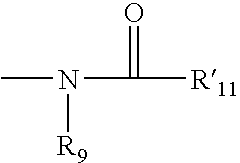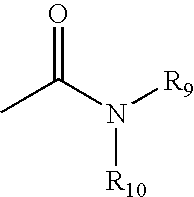Heterocyclic analgesic compounds and methods of use thereof
a technology of analgesic compounds and compounds, applied in the field of heterocyclic analgesic compounds, can solve the problems of limited number of compounds that can be synthesized, limited choice of reagents and conditions that can be used for the synthesis of non-oligomeric libraries, and desensitization of receptors or ion channels
- Summary
- Abstract
- Description
- Claims
- Application Information
AI Technical Summary
Problems solved by technology
Method used
Image
Examples
example 2
Synthesis of N-Boc-piperidin-3-yl-formaldehyde (3)
##STR20##
To a stirred suspension of pyridinium chlorochromate (98%, 34.0 g, 0.155 mol) and Celite (24 g) in 200 mL of dry CH.sub.2 Cl.sub.2 was added N-Boc-3-piperidinemethanol (2) (22.15 g, 0.103 mol) in 30 mL of CH.sub.2 Cl.sub.2 in one portion, and the mixture was stirred at room temperature overnight. The mixture was filtered by passing through a funnel filled with 20 g of Celite. After the solvent was removed, the remaining oily residue was purified by a flash column (silica gel; hexane:ethyl acetate, 4:1) to afford 3 as a colorless oil 17.5 g (80%).
example 3
Synthesis of N-(1-Boc-piperidin-3-ylmethyl)-aniline (4)
##STR21##
To a solution of N-Boc-piperidin-3-yl-formaldehyde 3 (5.20 g, 24.4 mmol) in 50 mL of dry methanol and 50 mL of trimethylorthoformate was added aniline (2.50 g, 1.1 eq.), and the mixture was stirred at room temperature for 30 minutes. NaBH.sub.3 CN (95%, 1.84 g, 1.1 eq.) was introduced in one portion, and the mixture was stirred at room temperature overnight. The mixture was quenched with 30 ML of aqueous potassium carbonate (sat.), then extracted with ethyl acetate (3.times.100 mL). The extracts were combined and washed with aqueous NaHCO.sub.3 (sat., 2.times.50 mL), brine (50 mL), and dried over anhydrous sodium sulfate. After the solvent was removed, the remaining oily residue was purified by a flash column chromatography (silica gel, hexane:ethyl acetate (1:1) to afford N-(1-Boc-piperidin-3-ylmethyl)-aniline 4 as white solid (5.60 g, 79%). IR (film, cm.sup.-1) 3520, 3263, 3004, 2976, 2932, 2854, 1688, 1589, 1521, 148...
example 4
Synthesis of N-(1-Boc-piperidin-3-ylmethyl)-N-phenyl-propionamide (5)
##STR22##
To a solution of N-(1-Boc-piperidin-3-ylmethyl)-aniline 4 (4.60 g, 15.8 mmol) and N,N-diisopropylethylamine (1.40 mL, 15.8 mmol) in 25 mL of dry methylene chloride was added propionyl chloride (1.40 mL, 15.8 mmol) dropwise at 0.degree. C. After being stirred at room temperature overnight, the reaction mixture was quenched with 30 mL of H.sub.2 O and extracted with ethyl acetate (3.times.100 mL). The extracts were combined and washed with aqueous HCl (5%, 20 mL), NaHCO.sub.3 (sat., 2.times.30 mL), brine (50 mL), and dried over anhydrous sodium sulfate. After the solvent was removed, the remaining oily residue was purified by a flash column chromatography (silica gel, hexane:ethyl acetate) to afford N-(1-Boc-piperidin-3-ylmethyl)-N-phenyl-propionamide 5 as a colorless oil (4.50 g, 82%). IR (film, cm.sup.-1) 2975, 2934, 2854, 1690, 1663, 1591, 1496, 1422, 1402, 1365, 1265, 1242, 1176, 1149, 1038, 962, 775, 70...
PUM
| Property | Measurement | Unit |
|---|---|---|
| temperature | aaaaa | aaaaa |
| pH | aaaaa | aaaaa |
| time | aaaaa | aaaaa |
Abstract
Description
Claims
Application Information
 Login to View More
Login to View More - R&D
- Intellectual Property
- Life Sciences
- Materials
- Tech Scout
- Unparalleled Data Quality
- Higher Quality Content
- 60% Fewer Hallucinations
Browse by: Latest US Patents, China's latest patents, Technical Efficacy Thesaurus, Application Domain, Technology Topic, Popular Technical Reports.
© 2025 PatSnap. All rights reserved.Legal|Privacy policy|Modern Slavery Act Transparency Statement|Sitemap|About US| Contact US: help@patsnap.com



